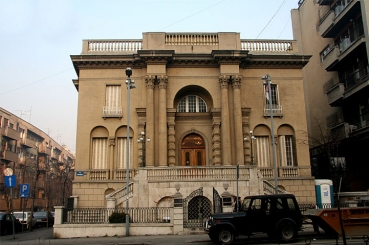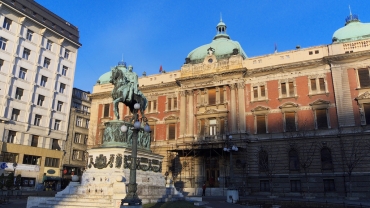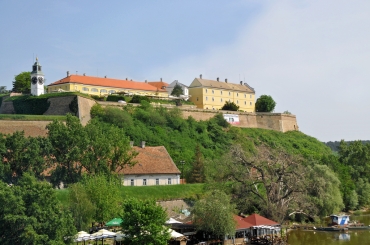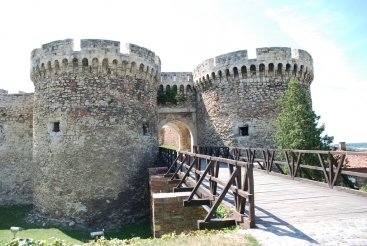The Republic of Serbia
Serbia is considered to be one of the most beautiful and hospitable countries in South-Eastern Europe. Since Byzantine times, it has preserved customs and Orthodox principles. Serbia is a country of royal vineyards, diverse landscapes and national parks. The West and the East are reflected in the Serbian architecture. Serbia abounds in old monasteries and fortresses.
Over the centuries, the territory of Serbia had been part of Rome, then – Byzantium. For five long years, it had been ruled by the Ottoman Empire. However, Serbia has managed to maintain its unique traditions and culture that have marked out Serbia among other Slavic countries.
In Serbia, you can see many fortresses and strongholds, which were built during the times of the Roman Empire and in medieval era. Local residents erected the fortresses on the cliffs or mountains, surrounded by the Danube, the Ibar and others rivers. Bač Fortress, Golubac Fortress, Zvečan Fortress, Petrovaradin Fortress, and Stari Grad are considered to be the most beautiful architectural monuments in the country.
Many centuries ago, the cradle of the Serbian Kingdom was located on the valleys of the Ibar and Raška rivers. Due to the first kings ruled there, this area is called "the Valley of the Kings", or "Valley of the Ages". A few monasteries built on these valleys have kept the remains of the Serbian kings. These temples are masterpieces of the architecture C12th-13th. Their unique architecture and Byzantine frescoes are so impressive. Two world known active Orthodox monasteries – Sopoćani and Studenica – are protected by UNESCO.
A great number of monasteries in Serbia emphasize religiousness of its inhabitants. All the monasteries were built during the golden age of Serbia. In architecture, they went from the Byzantine style to medieval styles. Banjska, Gračanica, Žiča, Kalenić, Ljubostinja, Manasija, Mileševa and other monasteries were built according to tendencies of the Morava and Raška schools. Structures built later are impressive as well. Saint Sava Cathedral, for instance, is loved by tourists due to its fine shape.
The capital of Serbia is Belgrade. It is one of the oldest cities in Europe. Belgrade Fortress and Kalemegdan Park, located in Stari Grad of the capital, are considered by many as the heart of the city. The city of Niš abounds in cult buildings, and such picturesque cities as Subotica and Novi Sad are famous due to their striking festivals.
The diversity of the Serbian nature fascinates every tourist. Plains and mountains, waterfalls, gorges, river valleys, lakes and forests harmoniously create a unique picture. The Danube is the largest and broadest river of the country. Such rivers as Sava, Great Morava, Tamiš, Ibar and others are famous for their picturesque banks. Several lakes – Vlasina, Đerdap and Ludoš – are considered by fishermen and hunters as a paradise. In summer, you can enjoy sailing competitions, as well as water skiing. The most famous hunting grounds of Serbia are Karađorđevo, Ristovac, Fruška Gora, Deliblatska Peščara and others.
A great part of the country is covered by mountains and highlands. The largest mountain range in Serbia is Kopaonik. Its ski resorts welcome visitors from November to March.
Serbia is known for its national parks. Their diverse and beautiful mountain landscapes are awesome. Fruška Gora, Đerdap, Šar Mountains, Tara and Kopaonik are the main national parks of Serbia. They are home to rare species of plants and various animals. You are well advised to visit such interesting places as Đavolja Varoš, a unique rock formation, Uvac River Canyon, Carska Bara and Deliblatska Peščara.
Serbia has always been famous for its healing springs, known since the times of the Roman Empire. These springs gave birth to Roman and then Serbian towns. The country abounds in ruins of the Roman baths. Today in Serbia, one may count over 50 health centres, where local mineral water and mud is used for health improving. The most famous health resorts of Serbia are Vrnjačka Banja, Bujanovačka Banja, Mataruška Banja, Ribarska Banja, Niška Banja and others.
One of the oldest traditions of the Serbian people is winemaking. In former times, vineyards used to belong to the Serbian kings. The country hosts wine festivals during harvest time. For many years, Smederevo Wine Festival has been held in the city of the same name. You are well advised to visit this event and sample local varieties of grapes – Vranac and Smederevka.
In Serbia, local traditions are deeply honoured. Various holidays and festivals are arranged in the country. In autumn you are advised to visit the International Theatre Festival. Most holidays are held according to local peculiarities – Mushroom Days in Divčibare or Beer Days in Zrenjanin, for instance. Petrovaradin Fortress hosts one of music festivals. The four-day open air festival of contemporary music is arranged in Lido, located on the river island of Great War. The city of Niš hosts the International Jazz Festival in summer.
The Serbs traditionally cook their national dishes for various holidays. The traditional local dish is jagnjetina ispod sača, usually served with kaymak, a creamy salted dairy product. Vegetables are always served. You should definitely sample healthy srpska salata and flavoured sarma. Ukha, better known in Serbia as riblja čorba, is one of the most popular first courses. The most favourite drink of the Serbs is coffee.
Stunning landscapes, the hospitality of local people, traditions and festivals, as well as amazing food make Serbia one of the most attractive countries in Europe.
Administrative division — Serbia
-
Belgrade Population: 1273651
- Jagodina Population: 36092
- Kragujevac Population: 147281
- Kraljevo Population: 63030
- Leskovac Population: 59610
- Novi Pazar Population: 60638
- Novi Sad Population: 215400
- Pančevo Population: 76654
- Požarevac Population: 42963
- Šabac Population: 52822
- Smederevo Population: 63028
- Sombor Population: 48454
- Valjevo Population: 58184
- Vranje Population: 54456
- Zaječar Population: 42916
- Zrenjanin Population: 75743
- Central Serbia
- Vojvodina Population: 2134409



























